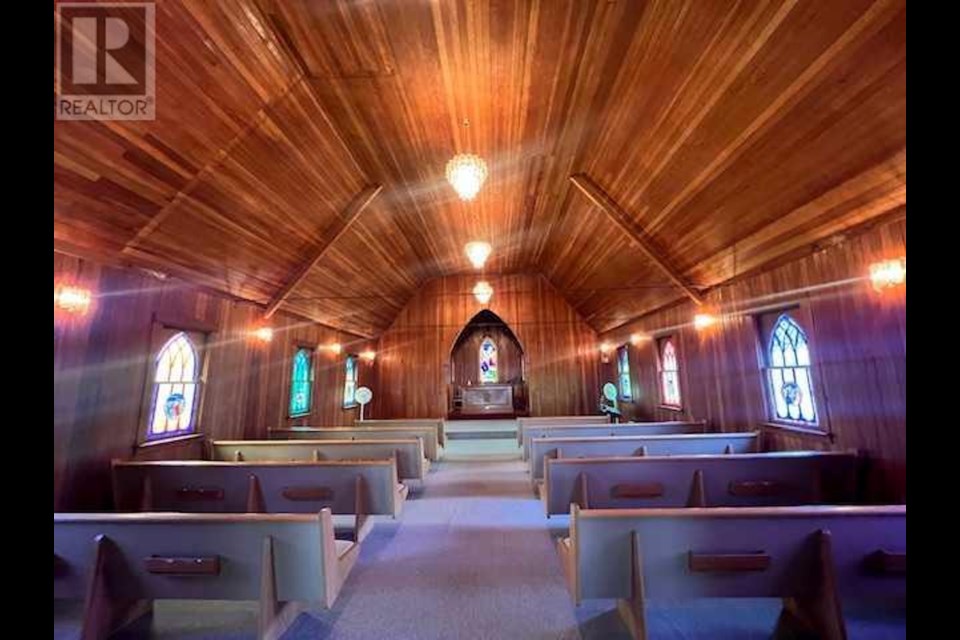BOYLE — Village of Boyle councillors heard a novel proposition regarding an old piece of real estate from members of the Boyle Archives Committee during their Oct. 16 council meeting.
Alice Wlos was joined by MaryAnn Walker and Don Alexander to pitch their idea of turning the now unused St. Paul’s Anglican Church into a museum to display the archives relics, host events, and serve as a tourist information spot for both locals and passersby.
“The Anglican Church in the Diocese of Athabasca, St. Paul’s, is interested in disposing of their two lots and the Anglican Church building on third street,” said Wlos. She read from two letters drafted in early October; one of which was sent to councillors, and another sent to Reverend David Greenwood, Bishop of the Diocese of Athabasca.
“It would be a shame for our community to lose one of its earliest historical sites, which served the community from 1929 to 2021,” she added.
Wlos et al.’s pitch to councillors included an ask for the village’s support through the donation of property taxes, utilities and insurance for the building if the museum comes to fruition. And while councillors understood the concept, they were unsure about the specifics of additional support requested by the committee.
“The vision is a good one,” said Derko, “I’m just wondering how this council, or how the village — ultimately the tax-payers — would be involved with the ask,” said village Mayor Colin Derko.
St. Paul’s church and the double lot it sits on was listed for sale by the Anglican Diocese of Athabasca with an asking price of $120,000. Neither the archives committee nor the village offered to buy the property outright, but talks about alternative options were had.
“I don’t know of an organization, whether it be a church or a recreation group that’s never short of money; everybody’s always short of money, so that’s what their focus would be. But maybe we can change that focus,” said Derko.
Wlos anecdotally referenced the sale of a church in the neighbouring hamlet of Ellscott for $1, and said in an Oct. 23 follow-up interview she hopes a similar arrangement can be made for Boyle’s St. Paul’s.
In 2015, the Hope Christian Reformed Church in Spruce Grove put their 100-year-old vacant chapel up for sale for $1 with the hope the building and the legacy would be preserved. The church was later purchased by a community group in 2016 for an unknown amount.
And in Ontario, three historic Catholic churches were offered to municipalities for $1 a piece in 2008, but came with repair price tags in the millions of dollars. Seven years later, an Ontario Anglican Church constructed in 1871 was listed for a dollar to attract a wide range of potential buyers.
However, the committee is still awaiting word from the Diocese; no response to the committees Oct. 9 letter has been received to date, and the Diocese’s take on the concept is one both the committee and village want to hear.
A piece of history
For Wlos, Walker, Alexander, and other members of the archives committee and locals, St. Paul’s church is more than a potential home for old farming equipment with meeting space for community groups. The building itself is a testament to the origins of the village and speaks to the sense of kinship still present in Boyle today.
“The pioneers of the community built the church with no grant money, all hand labour,” said Wlos. The church was finished in 1925 and according to Wlos, community members involved purchased artful stained-glass windows from another Anglican church located outside of town.
“The purchase was honoured by inscribing the names on a plaque under the windows; names like Cordingley, Hague, Hanson, Lund, Read, Alexander, Guy, Radmanovich, and Derko were all settlers in the Boyle district, and some of their generations are still here today,” Wlos added, pointing to councillors and staff around the room.
Sermons, services, and special events were held in the church for 92 years, coming to end in 2021 after the attendance declined and the congregation dwindled during the COVID-19 pandemic.
“It’s too bad — the community built the church, and it was given freely to the Anglican Church,” said Coun. Pat Ferguson. “In my view, they should have to give it back to the community.”
“Here, here!” chimed in Alexander. “Three generations of chopping wood and painting and cleaning and putting the chimney up for that building. The community has earned that building.”
But councillors had no shortage of questions during their post-presentation discussion, including what the next steps for the committee are, and how to express support for the project without volunteering to fund it completely.
“Two things would have to happen; first, the Anglican Church would have to want to do that, and then the community or the village would have the accept that, because by accepting that you’re also accepting the costs and the responsibilities of running it and upkeeping it,” said Derko.
Councillors decided to direct administration to write a letter of support for the committee’s endeavor to secure and convert the church to an archive and museum, as well as ask the committee for specifics on the type of support requested.
Wlos said the committee will first wait for response from the Anglican Diocese before proceeding with their mission, with the hope the building could be donated at no or low cost. No plans to fundraise for the full amount or pursue funding from historical resource grants have been made.
“The vision is well-laid out,” said Derko. “Having a museum in a small town in a church on a corner along a highway can’t seem more perfect.”
“I would much rather see it stick around as a museum and an archive,” he added. “But it takes money. No matter what, it takes money.”



